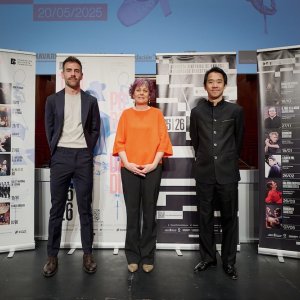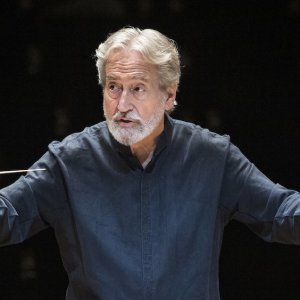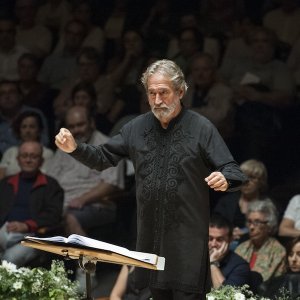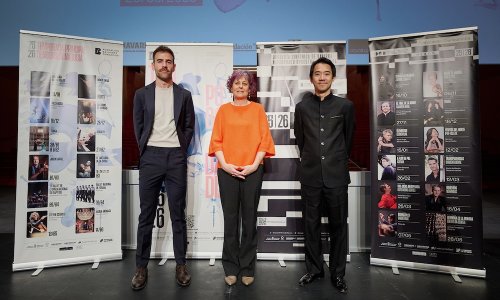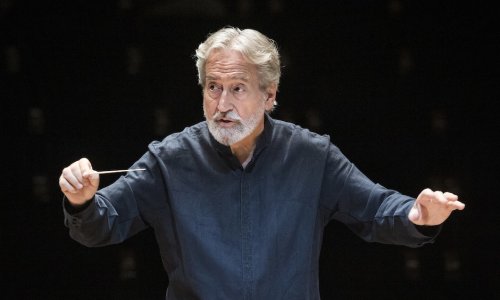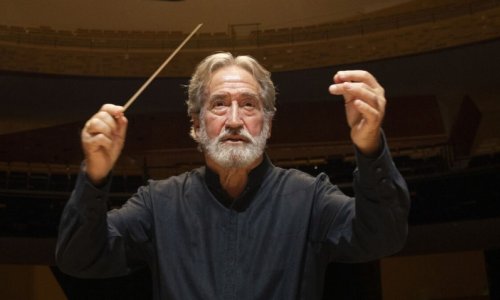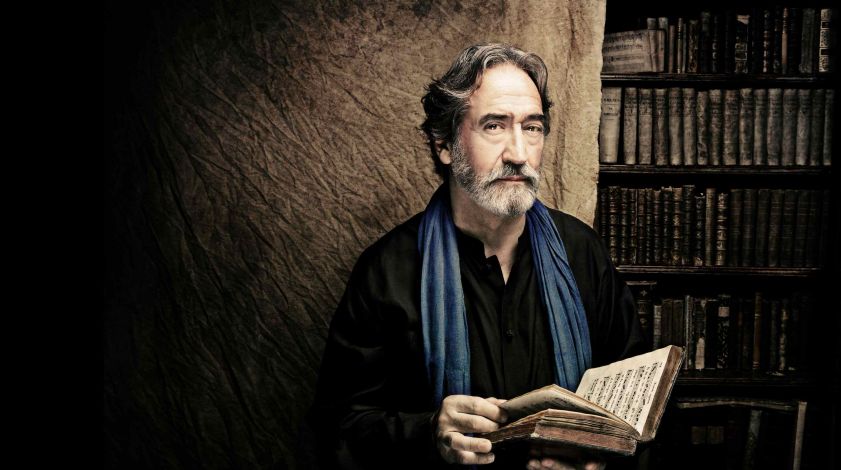
Jordi Savall: "In music, there is no room for lying"
* Click aquí para versión en castellano
To arrive at maestro Savall’s home in Bellaterra, is to reach a peaceful place where, by surprise, a huge and docile dog welcomes us. Courteous and relaxed, Jordi Savall receives us for a talk, next to his impressive library, full of books and, of course, scores he’ll be too keen to show us along his answers, illustrating his ideas and arguments. Talking to him is like a balm; the experience and depth coming from his words equally comfort and seduce, both for his calm when expressing his opinions and also for his security and depth which only an artist like him, in the full maturity of his career, irradiates. A comforting talk, then, with a figure of historical importance, now he’s turning 75.
You are always engaged in new projects. Are you going to conduct opera next season at the Liceu? What can you tell us about that?
We have two very beautiful projects, Il Teuzzone of Vivaldi in February and also in 2017, but November, we’ll present, this time staged, the opera Alcyone by Marin Marais, which is really exciting. Il Teuzzone is a piece of work that I discovered after directing Il Farnace, Vivaldi is a fabulous composer for voices. His success with instrumental music, especially in the Four Seasons, has placed his operatic compositions on a secondary level and nevertheless, he is a great opera composer. Il Teuzzone is also a very special work, with a story that takes place in China, with a very well defined but very baroque plot where the characters’ personality are really well drawn with their voices. Although it will be a semi-staged presentation, I’m really very excited because it is an important opera.
Since you mentioned the semi-staged opera, what are your thoughts on this option? Considering that opera is also eminently a visual and theatrical art.
It's funny, this season when directing The Fairy Queen at the Auditorium, I felt that, in the absence of scene, you enjoy music even more. Because you can get another sound power and work depth as not being distracted by any side effects. When the score is high quality, this is something fabulous. I would almost say that I enjoy it even more; and I might make some enemies by saying so. But in cases like The Fairy Queen, with music of such quality, giving priority to the colours of the work, recitations, the work becomes in itself a unique force.
Do you mean that a semi-staged version inspires the viewer’s imagination?
It's like when you read a fantasy novel and years later, you see the film version and you feel totally disappointed. Because the novel allows you to travel to a world without borders or boundaries and, then, the film is all more focused, more simplified, and often, you miss something. The same happens to me many times with music. I'm not afraid of directing Il Teuzzone in a concert because I’m certain that its music has enough power and ability to make us imagine what happens. In addition, we’ve done this opera before and we know it pretty well, so that is not exactly a version in concert, since there will be movements, appearances etc. Obviously, when you can make a staging, as we did with Gilbert Deflo and Orfeo by Monteverdi, getting in depth into that period of time is a great opportunity.
I understand that often the stage manager has to prove what can be done, but I also think that today, this dimension is exaggerated a little. If you revise the budget of any work, you wonder: what about music? It is not even a fifth of what the opera production costs; that’s to say, the most important part gets the smallest investment. There should be a balance.
Nevertheless, it is true that when a title is done for the very first time, as it happens now with Alcyone, it is important to see it in full, production included, because the opera hasn’t previously been staged.
Will it be then a world premiere?
It will be. First, we’ll do it in April 2017 in Paris and arrive at Barcelona in November. Moaty Louise is going to be the stage manager, with a faithful production to its character which will include mimes, jugglers, circus, etc. It will be a work of new recreation but based on the spirit of the original opera.
When a work has already been done, I do not mind about free versions with which one may or may not agree, but when it is staged for the first time, we must try to bring the work to what should have been in the first time. If you ever do it again, that’s different, at least, from my personal point of view.
In that sense, what is the most important for Jordi Savall, being faithful to the spirit of the work and its profound meaning, or be also faithful to the historical context in which the piece was created and give importance to the scenic wrapping?
Well, let's see, to what extent can the wrapping and the meaning of the work be separated? There are issues that can be transferred to other times or societies, sure, but the fact is that if you are playing Monteverdi’s music, it’s bound to sound like Monteverdi, and if there are tanks on the scene ... well… I'm afraid that at Monterverdi’s time there were no tanks.
Of course not, but there was a war anyway, also with weapons, etc.
Sure, but there were other kind of weapons. You see, deep down, it depends basically on how things are done. When the staging adds complementary things, then I agree, but when things are done against music, one wonders to what extent it is necessary and permissible. Anyway, it is very difficult to criticize taking a general view; a modern proposal can be great too.
Speaking of public awareness and repertoire, do you think some audience is more accustomed to certain composers?
I think it's an educational issue. It is possible that with Monteverdi one has to make an effort, in the sense that it works at different levels, but it is also true that in Orfeo by Monteverdi, music is at the text service from the beginning to the end. Instead, in Puccini for example, often the music is at the service of the singers. Orfeo doesn’t make any concessions to the star system, while in the bel canto, the show is for voices; so, at a scenic level, the leading role of the singer can almost completely stop the scene.
But, is it not precisely Monterverdi, the best ever bel canto? What is bel canto for Jordi Savall?
I've said it many times: Orfeo by Monteverdi is probably the first great opera and also the last, because in his later titles, some concessions are already made. However, in Orfeo, the music always goes to the text service, sung recitation; that is the purest opera form, everything that follows is an evolution following some criteria depending on the taste of the time and the composer has to adapt himself to these tastes.
Is language our common and everyday musical instrument?
No, language can be misleading and can explain things that are not true, it can lie, but in music, there is no room for lying. I mean that music can be so powerful, in the sense of its melody's intrinsic beauty that makes you travel to a level above the story that Bellini may be telling. The power of music is incredible.
You are a committed person. Do you think an artist with a recognised career like yours should be engaged, either politically or socially, in society?
If what we do as artists, if culture, basically, does not serve to improve our lives, then it doesn’t make any sense. I think art helps to a better life. What really convinces me to keep doing what I do is a situation like this: after a concert in Bogota, a couple approached me and said " your music has been with us for thirty-five years and thanks to you, our quality of life is better." That's priceless. I think we are at a vital moment as the end of a cycle, none other than the cycle of democracy, where our political model no longer works. We must raise awareness that if we, people with some open forum, don’t take a risk, we are not faithful to the reality of our time: we have to say, for example, that everything that is happening to refugees is not fair. And this is a common responsibility, of everybody. You shouldn’t forget that what we have got, we earned it protesting, fighting.
Do you think that an economic priority is over any other interest?
There is a very serious development today: people in power increase salaries of those who, in turn, are also in power at the expense of those with an increasingly lower salary. It is perverse.
Is this happening in music?
There are some egos. There is a cast of superstars here and there ... and we are distorting the balance. A country like Spain, with young people who have no work, unscrupulous multinationals ... and nobody says a word, everything remains the same. We are in a world that does not work, we have to do something before it blows up. We must be conscious that we have to take responsibility for the situation. I spent many years teaching in Switzerland: that’s a real democracy, over there, every person is responsible for their canton, their street, trees in their sidewalk. Life quality depends on education and today, profitability is rewarded more than anything else. But in life, there are countless things more important than profitability. Eventually, in Europe, we have come to accept a world that comes from America; we’ve forgotten that we have won a Welfare System, some rights ...
Would you say, then, that there is some sort of "contamination" of our mentality and way of life from the US, here, in Europe?
We are losing our identity, we all speak English and not the main European languages like French, German, Italian, Spanish ... we are not aware of our cultural identity. Europe is being built on an economic structure and not on its cultural wealth. We have much work to do to redress this.
Would you say that you had a very instinctive and self-taught training?
Yes, I consider myself a self-taught person basically. I was only seven years old when I started singing in a school choir and that was for me, my basic musical education: you learn to sing how you learn to speak and when you have the music inside, you learn how to distinguish notes and tempo. As Mark Twain said: "The two most important days in your life are the day you are born and the day you find out why ". I was lucky enough to discover this, for the first time, when I was fourteen years old and with my first cello in my hand, I felt at home. I discovered that the effort you make, gives an immediate result. A sort of family frustration was that I had to study business but I was not interested at all; in fact, it was a bad student, but when I had a cello in my hands, a new world opened in front of my eyes.
That instinctive part in your learning, is an identity of your own that, in the long-term, will set us apart from others?
I am heavily influenced by my own experience; our experiences can close or open our mind. What happens to us in our first four years of life can transform us into open or close people. If you have parents who love you and care for you, you will feel secure. I was eager to find my way; as I said, when I had my first cello, I found the path to personal liberation that I was seeking. I felt the power of music listening to Requiem by Mozart in a rehearsal, I decided, then, to start studying cello. All my life I have moved by intuition. After listening to Pau Casals in Prades, I had a major impact I will never forget. He was almost eighty years and the way he projected his energy ... how exciting it was! So for me, making music is a way of life, to convey what I feel deeply and this is a huge privilege.
You see, now that I’m 75 years old, I still keep the illusion every day when I wake up, with new projects, readings, my ideal of modern life is the same Gandhi had: "Live life as if you were to die tomorrow.” And I would add: study each day as if you were to live a thousand years.
Gustav Leonhardt, Christopher Hogwood or Nikolaus Harnoncourt, among many others, are key names in historicist interpretation criteria. Some of them are no longer with us but they’ve become a list of musicians with huge influence and you are already part of them. From the outside, how do you see yourself being part of this list?
I was part of a group of artists who decided to take risks. And thanks to that, today, a variety of music has been recognized and has become part of the classical repertoire. This may have been possible because, at one point, someone like Leohardt decided he had to play with a harpsichord and not a piano; or someone like Harnoncourt who decided he would direct certain repertoire in a particular way. And I decided I would play the viola da gamba as I thought it should be played. I think I've been very consistent in my life and my way of making music. I started making music with Gustav Leonhardt when he created La Petite Bande, playing baroque repertoire with Anner Bylsma and Sigiswald Kuijken. I was in the creation of The English Concert, with Trevor Pinnock and Stephen Preston and I travelled every week from Basel to London to play with them. It was Nikolaus Harnoncourt who recommended me to substitute my teacher at the School Cantorum in Basel, in the subjects of chamber music and viola da gamba. It was a period in which each of us, in our own way, contributed to learn that music is not only important for what it means within the story but also has a value for what it can provide today.
Translation: Ester Carrasco




